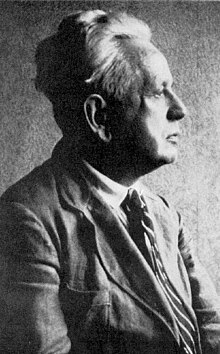Ernest Cassirer
| Ernst Cassirer | |
|---|---|
 |
|
| Born |
July 28, 1874 Breslau, Silesia, Prussia (now Wrocław, Poland) |
| Died | April 13, 1945 (aged 70) New York City, New York, U.S. |
| Alma mater |
University of Marburg (Dr.phil., 1899) University of Berlin (Dr.phil.habil., 1906) |
| Era | 20th-century philosophy |
| Region | Western Philosophy |
| School | Neo-Kantianism |
|
Notable ideas
|
Philosophy of symbolic forms Ontic structural realism |
|
Influenced
|
|
Ernst Cassirer (/kɑːˈsɪərər, kə-/;German: [kaˈsiːʁɐ]; July 28, 1874 – April 13, 1945) was a German philosopher. Trained within the Neo-Kantian Marburg School, he initially followed his mentor Hermann Cohen in attempting to supply an idealistic philosophy of science.
After Cohen's death, Cassirer developed a theory of symbolism and used it to expand phenomenology of knowledge into a more general philosophy of culture.
Cassirer was one of the leading 20th century advocates of philosophical idealism.
Born in Breslau in Silesia (modern-day southwest Poland), into a Jewish family, Cassirer studied literature and philosophy at the University of Marburg (where he completed his doctoral work in 1899 with a dissertation on Descartes's analysis of mathematical and natural scientific knowledge entitled Kritik der mathematischen und naturwissenschaftlichen Erkenntnis—Critique of Mathematical and Scientific Knowledge) and at the University of Berlin (where he completed his habilitation in 1906 with the dissertation Das Erkenntnisproblem in der Philosophie und Wissenschaft der neueren Zeit: Erster Band—The Problem of Knowledge in Philosophy and Science in the Modern Age: Volume I).
...
Wikipedia
